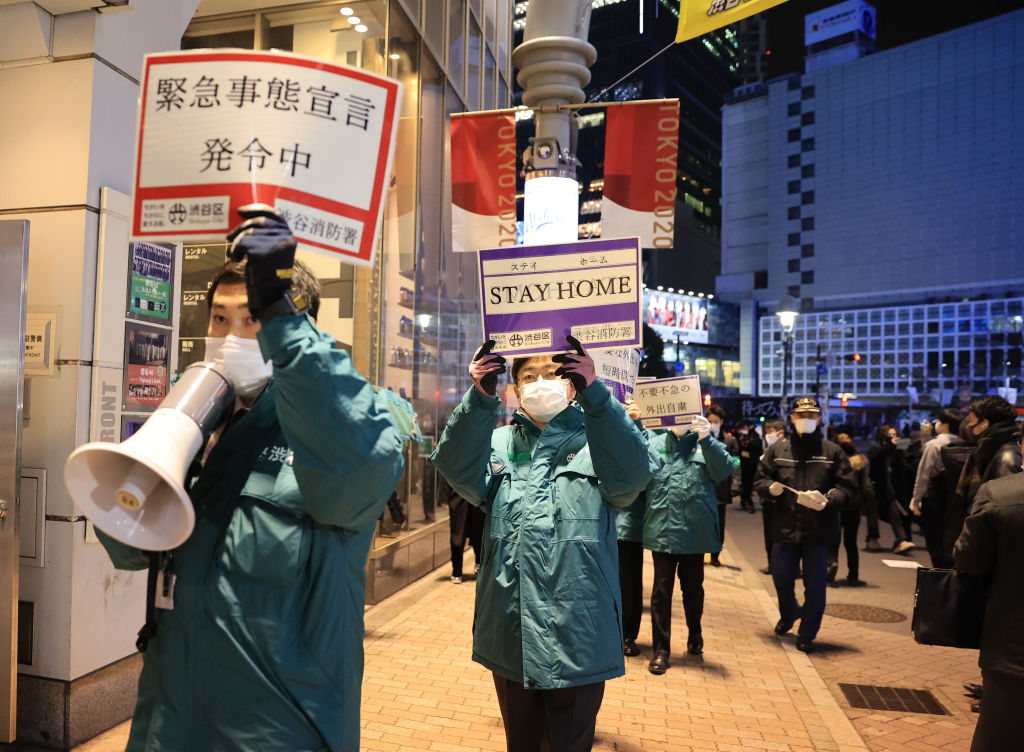
- Article
- Japanese Politics
Japan’s Challenges in the Next Year Are Greater Than Its Opportunities
February 15, 2021
* * *
This year posed particular problems for democratic governments. While autocracies could limit human activities and rights with relative ease, virtually all democracies struggled to strike a delicate balance between the health imperatives posed by COVID-19 and economics and rights concerns, with a few exceptions such as Taiwan and Australia. Japan was no exception. Despite the fact that the country has fewer COVID-19 cases than many of its Organization for Economic Co-operation and Development (OECD) peers, the Japanese government under first Shinzo Abe and now Yoshihide Suga has faced many criticisms from a jittery public for its slow, inconsistent, or overly onerous measures aimed at slowing the virus’s spread.
As Japan prepares to ring in the new year, Prime Minister Suga faces major challenges. First and foremost is the late fall surge in COVID-19 cases. All the public criticisms against the government notwithstanding, Japan had managed the spread of the virus reasonably well until recent weeks. While the number of daily new cases is still two digits lower than in the United States, daily records have been set many times in the past few weeks and the virus now threatens to push Japan’s public health infrastructure toward the breaking point. The first few months of 2021 likely will be extremely tenuous for many Japanese, as they withstand the winter months spent mostly indoors and not necessarily with family members, waiting for the vaccine to arrive in the spring (at the earliest).
On the economic side of the pandemic, the Suga administration had to suspend the popular Go To Travel campaign, which was designed to stimulate consumption via domestic tourism. Suga was slow to suspend the campaign, since this would make it more difficult for small- and medium-sized businesses to survive, but his delay was roundly criticized in the media and among the public. In the coming months, he will have the daunting task of threading the needle between containing the pandemic and avoiding economic catastrophe. One thing seems sure: If the recent surge in COVID-19 cases is not contained, the economic damage will be devastating.
The political scandals of Suga’s predecessor are further limiting the prime minister’s ability to enact meaningful policy change. Prosecutorial focus on the prior administration has reached a boiling point in recent weeks, leading to separate investigations focusing on Abe, his first secretary, and his former agriculture minister. These cases allege corruption involving supporters of the administration and quid pro quo favors. Since Suga was Abe’s chief cabinet secretary, his potential knowledge of and involvement in these events are under the microscope as well, distracting him from governing and reducing his political capital—although he has not been accused of wrongdoing.
These two domestic issues—the pandemic and scandals—have combined to hit the Suga administration hard in the past few weeks, and his approval rating, which was very high when he took office is now down to 40 percent. Public support is not so low that it would end his administration right away, but if he can’t stop the slide with some effective measures, Suga might not last until the important elections next fall (LDP presidential and Lower House elections).
If Suga can survive into the summer, new opportunities could open up for him. Presiding over a successful Tokyo Olympics could do wonders for his domestic and international image, even if he is not closely involved in the actual operation of the games. Showcasing to the world its technological advances, logistical mastery, cultural assets, tourist attractions and economic resilience, Japan could unite around the summer events, and Suga could benefit from an increased sense of national pride.
In addition, his signature domestic policy priorities likely would have produced some tangible outcomes by then, whether in the reduction of mobile phone bills, subsidies for infertility treatment, or any number of digital transformation initiatives that would reduce red tape in government operations. The COVID-19 pandemic created a tailwind for some of these policy reforms, and the Japanese public likely will value the reduced burden and added convenience that they bring, boosting Suga’s reputation as a “man of the people.”
In foreign affairs, Suga will have a chance to develop rapport with his American counterpart, President-elect Biden, once he has settled into the White House. He can use this as a springboard to restore a more professional handling of U.S.-Japan relations, rooted in mutual trust and support for multilateral frameworks. Led by career diplomats and experienced policymakers, the Biden administration should be able to soften the U.S. government’s anti-China rhetoric and establish more pragmatic relations with the Eastern power. While there is some concern that the Biden foreign policy team is oriented more toward the Middle East than East Asia, Biden cannot avoid China as his main diplomatic focus, and Japan is his best partner in dealing with China. The Suga administration has some key players such as Toshihiro Nikai, the former minister of economy, trade and industry and the current secretary general of the Liberal Democratic Party, who have strong pipes to China, and should be able to fulfill the role that Japan is expected to serve in coming years—the mediator between two superpowers.
In serving this role, the trust that Japan has cultivated among other players in the region will be valuable. Member countries of the Association of Southeast Asian Nations (ASEAN) are the key swing votes in the competition for hegemony in the Asia-Pacific, and Japan is seen consistently as the most trusted partner in Southeast Asia. The Quad, the Comprehensive and Progressive Agreement for Trans-Pacific Partnership (CPTPP), the Regional Comprehensive Economic Partnership (RCEP), and other multilateral frameworks that Japan has been instrumental in developing are widely recognized as the best bet in containing China in both security and trade.
One missing piece in this equation is South Korea, a developed democracy and a natural partner for Japan. Because of historical disputes, the relationship has soured and the important alliance among the U.S., Japan and South Korea has not functioned well. Here, the Biden administration can be the mediator, convincing the parties to find the middle ground, to ensure that South Korea does not fall into China’s orbit.
Recent signals from South Korea indicate that it is prepared to work things out. For his part, Suga would have to strike a more conciliatory tone toward South Korea, despite the political risk of such an approach domestically. To be able to do that, it is crucially important that Suga secure domestic support, which will come only if he can get out of the two key challenges he’ll face in early 2021—COVID-19 and his predecessor’s political scandals.



